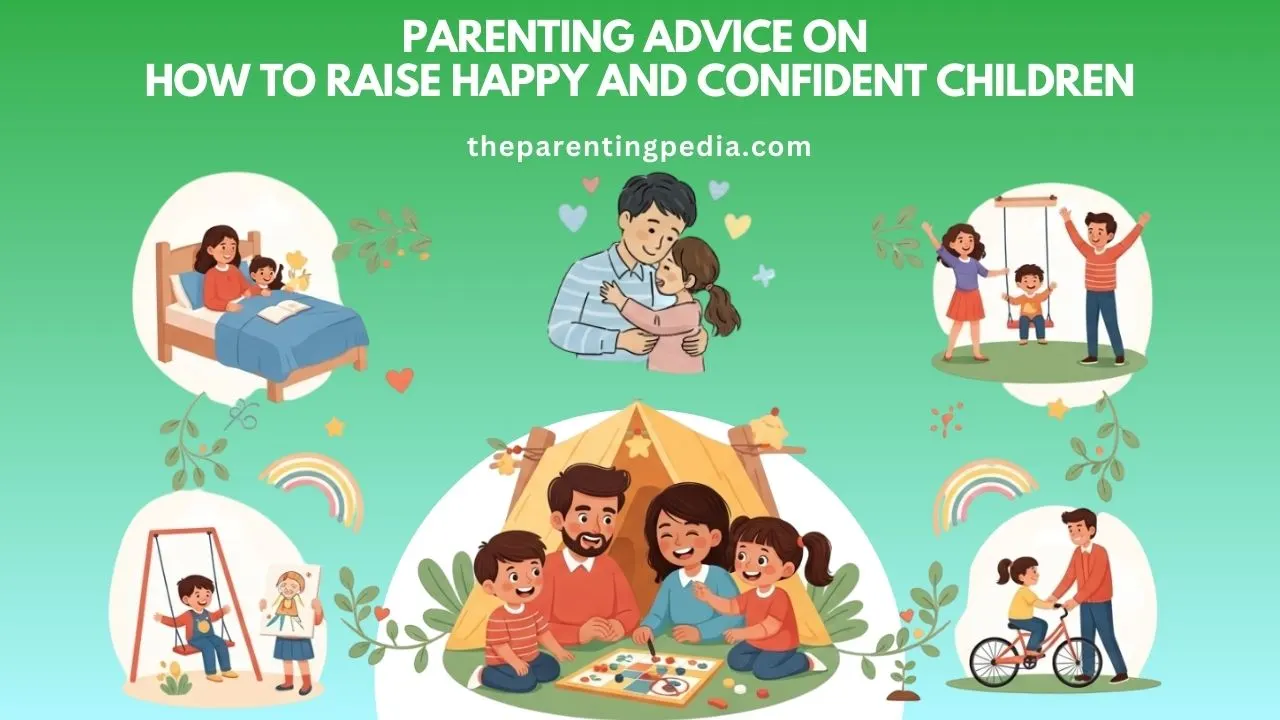Parenting is one of the most rewarding and challenging journeys in life. Every parent wants their child to grow up happy, confident and capable of facing the world. While there is no single handbook that works for all families, there are some universal principles that guide parents toward raising emotionally strong and resilient children. This article shares practical parenting advice in simple language, making it easier for parents to apply in their daily lives.

Why Parenting Advice Matters?
Every stage of childhood comes with unique joys and challenges. Parents often find themselves questioning whether they are doing things right. From setting rules to handling tantrums, making choices about discipline or balancing work and family life, parenting can sometimes feel overwhelming. In these moments, reliable parenting advice helps parents feel more confident. By learning proven strategies, parents can create a nurturing environment where children feel secure, loved and supported.
🎯 Participate in Offers and Redeem Your Reward Now
Building Strong Emotional Bonds
One of the most important pieces of parenting advice is to prioritize emotional connection. Children who feel loved and understood develop stronger self esteem and a deeper sense of security. Simple acts such as hugging, spending quality time and listening attentively make a big difference. Parents who focus on bonding teach their children that they are valued, not just for their achievements but for who they are as individuals. Ways to strengthen emotional bonds with children include:
- Spending a few minutes each day engaging in one-on-one activities.
- Listening without judgment when children share their feelings.
- Offering comfort and reassurance during tough moments.
- Celebrating achievements, both big and small.
- A strong emotional bond lays the foundation for confidence and trust, making it easier for children to face challenges.

Setting Boundaries with Love
Another crucial aspect of parenting advice is teaching children about limits. Boundaries provide structure and safety while also teaching children responsibility and respect for others. However, setting rules should always be balanced with empathy and understanding. For example, instead of saying, “Don’t ever shout” a parent might say, “I understand you are upset, but let’s talk calmly so I can help you.” This shows children that while their emotions are valid, their actions should be respectful.
Consistent boundaries help children in many important ways. They learn self control by understanding limits, develop respect for family and social rules and also feel safe knowing what is expected of them. Boundaries provide structure, which gives children both security and guidance as they grow.
No more storage headaches! 📸 Turn your photos into easy shareable links
fast, free & simple ✨ https://imagelink.online
Encouraging Independence
One piece of parenting advice often overlooked is allowing children to do things for themselves. Encouraging independence boosts confidence and teaches problem solving skills. Even small responsibilities such as choosing their clothes, helping set the table or completing homework independently can make children feel capable. When parents step back and let children try, even if they make mistakes, they give them a chance to learn resilience. Over time, children who are allowed to explore their abilities become more confident in handling challenges without fear of failure.
Communication: The Key to Building Strong Parent-Child Connection
Open communication is at the heart of effective parenting. Good parenting advice emphasizes the importance of listening as much as speaking. Children are more likely to share their thoughts and struggles when they feel heard and respected. Healthy communication builds trust, strengthens the parent-child bond and prepares children to express themselves confidently in the wider world. Parents can improve communication by:
- Asking open-ended questions instead of yes/no ones.
- Avoiding constant lectures, which may cause children to withdraw.
Also Read: Challenges Faced by Parents of Children with ADHD
- Respecting their child’s opinions, even when they differ.
- Keeping conversations calm and supportive with children.
Teaching Emotional Regulation To Children
Another valuable piece of parenting advice is to teach children how to manage emotions. Children often feel overwhelmed by big emotions such as anger, sadness or frustration. Parents who model calmness and teach coping strategies help children build emotional resilience. Children who learn to regulate their emotions become more confident in social interactions and better equipped to handle life’s challenges. Some ways parents can help teaching emotional regulation to children include:
- Naming emotions in front of children, “I see you are feeling sad right now.”
- Teaching calming techniques like deep breathing to children.
- Encouraging creative outlets such as drawing or journaling.
- Showing empathy to children instead of dismissing their feelings.
Snap it, link it, share it! 🚀 Super easy & 100% free. Start sharing smarter today 👉 https://imagelink.online
The Role of Positive Reinforcement in a Child’s Life
Positive reinforcement is an essential element of parenting advice for raising confident children. Instead of focusing only on correcting mistakes, parents should recognize and praise positive behaviors. Praising effort rather than results also teaches children that trying their best is just as important as succeeding. Benefits of positive reinforcement include:
- Building self esteem.
- Encouraging cooperation.
- Strengthening parent-child relationships.
🔥 Complete Tasks – Unlock Exclusive Rewards Today!
Balancing Screen Time and Real Life Experiences
In today’s digital age, many parents struggle with managing technology use. A helpful piece of parenting advice is to balance screen time with real life interactions. Excessive use of gadgets can affect sleep, social skills and physical health. Parents should encourage outdoor play, hobbies and family activities to create a healthy balance. For example, parents can set daily limits on screen use, encourage family meals without devices and promote physical activities such as biking or sports. These practices not only support healthy development but also promote stronger family connections, creating a balanced and nurturing environment for children.
Self Care for Parents
Effective parenting advice is not only about the child but also about the parent. Parenting can be exhausting and stressed parents may struggle to provide the patience and attention children need. Practicing self-care helps parents recharge, making them more capable of handling challenges calmly. This can include taking short breaks during the day, asking for help from family or friends, engaging in hobbies or exercise and practicing mindfulness or relaxation techniques. When parents care for their own well-being, they set a powerful example for their children about balance and self-respect.
Common Parenting Challenges and How to Overcome Them
Even with the best intentions, parents face difficulties such as sibling rivalry, tantrums or academic pressure. Helpful parenting advice reminds parents to stay patient and consistent. Every challenge is also an opportunity to teach problem-solving, resilience and empathy. For example, instead of punishing siblings for fighting, parents can guide them to discuss their feelings and agree on solutions. This teaches cooperation and conflict resolution to children.

Conclusion
Raising happy and confident children requires patience, love and the willingness to learn. While every child is unique, the principles of positive discipline, emotional connection, independence and open communication apply to all families. Reliable parenting advice provides parents with strategies to guide their children through life’s challenges while strengthening family bonds. Ultimately, parenting is not about perfection but about progress. By focusing on connection, encouragement, and understanding parents can raise children who feel loved, secure and ready to succeed in the world.
FAQ
How to raise confident and happy kids?
Parents can raise confident and happy kids by offering unconditional love, setting consistent boundaries and encouraging independence. Positive reinforcement, open communication and celebrating effort rather than perfection build self-esteem. Creating a supportive home environment where children feel safe, valued and heard helps them grow into resilient, joyful individuals.
What is the secret to raising confident children?
The secret to raising confident children lies in balancing love, guidance and independence. Parents should encourage problem-solving, praise effort and allow mistakes as learning opportunities. By modeling self-confidence, respecting their child’s voice and providing a safe, supportive environment, parents help children believe in themselves and face challenges with courage.
What is the secret to raising confident children?
Let kids take age-appropriate risks to do what they’re excited about, even if they might get hurt. If you don’t, they might hear that you don’t think they are strong enough to do it. Teach your children that they can make their own decisions.
How to build your child’s self-esteem and confidence?
Tell them how much you love them, and what makes them special to you. Try to focus on specific things you notice about them. This is better than general praise like telling them they are ‘good’. Being specific helps them to notice their strengths, which can boost their self-esteem.
How to encourage your child to be positive?
Set up your child to behave positively, and then praise them for it. For example, give your child some simple chores or things that they can do to help the family. Praising your child’s behaviour and effort will encourage your child to continue.
Kickstart your journey with this practical guide to profitable business ideas.
